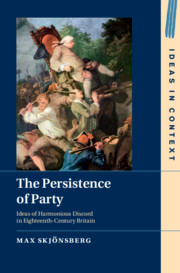Book contents
- The Persistence of Party
- Ideas In Context
- The Persistence of Party
- Copyright page
- Dedication
- Contents
- Figures
- Acknowledgements
- Note on the Text
- Abbreviations
- Introduction
- Chapter 1 Background, Contexts, and Discourses
- Chapter 2 Rapin on the Origins and Nature of Party Division in Britain
- Chapter 3 Bolingbroke’s Country Party Opposition Platform
- Chapter 4 David Hume’s Early Essays on Party Politics
- Chapter 5 Faction Detected? Pulteney, Perceval, and the Tories
- Chapter 6 Hume on the Parties’ Speculative Systems of Thought
- Chapter 7 Hume and the History of Party in England
- Chapter 8 Political Transformations during the Seven Years’ War: Hume and Burke
- Chapter 9 ‘Not Men, But Measures’: John Brown on Free Government without Faction
- Chapter 10 Edmund Burke and the Rockingham Whigs
- Chapter 11 Burke’s Thoughts on the Cause of the Present Discontents
- Chapter 12 Burke and His Party in the Age of Revolution
- Chapter 13 Burke and the Scottish Enlightenment
- Conclusion
- Bibliography
- Index
Chapter 11 - Burke’s Thoughts on the Cause of the Present Discontents
Published online by Cambridge University Press: 27 January 2021
- The Persistence of Party
- Ideas In Context
- The Persistence of Party
- Copyright page
- Dedication
- Contents
- Figures
- Acknowledgements
- Note on the Text
- Abbreviations
- Introduction
- Chapter 1 Background, Contexts, and Discourses
- Chapter 2 Rapin on the Origins and Nature of Party Division in Britain
- Chapter 3 Bolingbroke’s Country Party Opposition Platform
- Chapter 4 David Hume’s Early Essays on Party Politics
- Chapter 5 Faction Detected? Pulteney, Perceval, and the Tories
- Chapter 6 Hume on the Parties’ Speculative Systems of Thought
- Chapter 7 Hume and the History of Party in England
- Chapter 8 Political Transformations during the Seven Years’ War: Hume and Burke
- Chapter 9 ‘Not Men, But Measures’: John Brown on Free Government without Faction
- Chapter 10 Edmund Burke and the Rockingham Whigs
- Chapter 11 Burke’s Thoughts on the Cause of the Present Discontents
- Chapter 12 Burke and His Party in the Age of Revolution
- Chapter 13 Burke and the Scottish Enlightenment
- Conclusion
- Bibliography
- Index
Summary
This chapter considers Burke’s most famous text in defence of party: Thoughts on the Cause of Present Discontent (1770). With political life having been essentially purged of Jacobitism, an unapologetic case for party was now possible. This party, posing as the Whig party, viewed itself as the protector of Britain’s Revolution Settlement and its mixed and balanced constitution in opposition to what was perceived as a revived Toryism supporting George III and his favourite Bute’s ‘court system’. Burke viewed men and measures as interlinked and believed that a party had to seek office and negotiate with the monarch as a corps. This was diametrically opposed to the earlier ‘not men, but measures’ slogan at the heart of John Brown’s writings and the Pittite patriot platform.
Keywords
- Type
- Chapter
- Information
- The Persistence of PartyIdeas of Harmonious Discord in Eighteenth-Century Britain, pp. 253 - 276Publisher: Cambridge University PressPrint publication year: 2021

